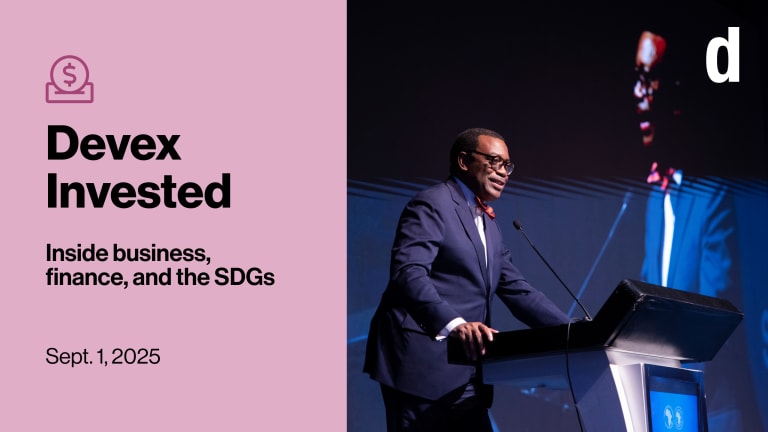
MUMBAI, India — The Asian Infrastructure Investment Bank on Monday announced support for India’s National Investment and Infrastructure Fund. The $100 million equity investment is the first phase of funding for NIIF, a collaborative platform for those interested in investing in commercially viable Indian infrastructure projects. A second phase will likely see another $100 million tranche, according to the bank.
Presented at the China-backed bank’s third annual meeting in Mumbai as the type of deal AIIB plans to ramp up, the venture is also a highly controversial intermediary lending structure that has watchdogs warning of the dirty energy and social harm it could end up funding.
See more topics:
► Funding Report: Emerging Donors 2.0
► AIIB voluntarily adopts MDBs’ cross-debarment list
The location of the venture isn’t surprising. India has picked up almost 28 percent of the bank’s total lending so far, totaling $1.4 billion for seven projects, according to India’s Minister of Railways and Coal Piyush Goyal, who spoke at a press conference at the meeting.
To spur movement in areas such as green growth and affordable housing, the bank is increasingly looking to mobilize private capital from global long-term investors. AIIB President Jin Liqun made multiple references throughout the meeting to the importance of attracting investment from pension funds, endowments, and insurance companies. Some of AIIB’s investment is already being channeled through financial intermediaries — including commercial banks or funding platforms such as NIIF — which receive funds from AIIB and then lend to companies to execute a range of infrastructure projects. It’s this “hands-off” lending that has civil society actors increasingly concerned over the structure of the latest deal, which they say lacks systems to ensure safeguards and transparency through all funding levels.
The involvement of NIIF could also serve to revive a host of stalled projects in the country — many of which, including the controversial Srikakulam Thermal Power Station in Andhra Pradesh, were shelved because of high social and environmental risks, Bank Information Center Europe Co-Director Kate Geary told Devex in Mumbai.
The World Bank’s International Finance Corporation has already been forced to reduce this kind of lending via third party financial intermediaries because of human rights and environmental scandals, Geary added.
Along with the Centre for Financial Accountability-India, Geary released a report prior to this week’s meeting urging AIIB to reject the $200 million investment: “AIIB doesn’t have strong enough social and environmental standards to prevent making the same mistakes that other [multilateral development banks] have made, particularly when it’s doing this funding through financial intermediaries,” Geary said. “The IFC has just had to backtrack on that lending, yet the AIIB is jumping right in.”
AIIB recognizes the risk, and moved forward to invest in India’s “fund of funds” in part because they are confident in their own safeguards and able to benefit from the learnings of other banks, Laurel Ostfield, the bank’s head of communications and development, told Devex.
“If [AIIB] hadn’t gotten involved, quite likely a lot of these environmental and social standards wouldn’t have been applied to any of these projects, so we are actually able to raise the bar on environmental [and] social [standards] by participating in these.”
— Laurel Ostfield, head of communications and development at AIIB“We’ve been working on this for a long time, and the reason it’s been a long time is because the environmental and social standards are so important — because this is a financial intermediary and we want to make sure that our policies and standards are going to actually get applied,” Ostfield explained.
Prior to signing the deal, AIIB worked closely with NIIF’s management team to help them create their own environmental and social policy. This now includes requirements on environmental and social standards and grievance mechanisms to be applied throughout the investment chain on projects and business activities financed with AIIB’s investment.
NIIF has committed to monitor and support the subfunds, while reporting to AIIB about all inquiries received. AIIB, in the meantime, has retained the right to review corrective actions for appropriateness, according to Ostfield, who added that “there’s a flip side of the coin to consider” when working with financial intermediaries. This deal in particular, she said, will act as proving ground to see whether close collaboration in developing safeguards with the fund, followed by close monitoring, can deliver the projects they want to see.
“There’s always concerns about these things, but consider that if we hadn’t gotten involved, quite likely a lot of these environmental and social standards wouldn’t have been applied to any of these projects, so we are actually able to raise the bar on environmental [and] social [standards] by participating in these,” Ostfield said.
AIIB President Jin also addressed the NIIF deal in a press conference on Tuesday, calling the “fund of funds” model business as usual for the private sector, but innovative for a development bank.
“We could be very innovative, we could be creative, we could explore different kinds of approaches, but one thing is for sure, and we will never change — which is we attach importance to environmental social issues,” Jin said during the briefing.
Geary sees it differently, and thinks the bank’s propensity for risky deals will force it to backtrack on early promises it made to be “clean and green.” Already, AIIB has funded its first coal-burning project despite assurances it would lean away from coal, according to a report co-published by BIC Europe and Inclusive Development International.
AIIB approved a $150 million investment in IFC’s Emerging Asia Fund in 2017, which has invested $20 million in Myanmar’s Shwe Taung cement plant — a project that plans expansion through burning coal.
“You’ve made all these lovely green promises,” Geary said. “Through this type of intermediary lending, you're going to end up breaking them.”








